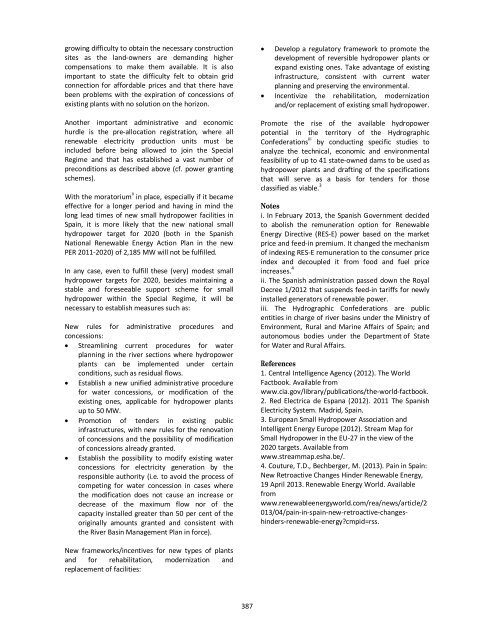WSHPDR_2013_Final_Report-updated_version
WSHPDR_2013_Final_Report-updated_version
WSHPDR_2013_Final_Report-updated_version
Create successful ePaper yourself
Turn your PDF publications into a flip-book with our unique Google optimized e-Paper software.
growing difficulty to obtain the necessary construction<br />
sites as the land-owners are demanding higher<br />
compensations to make them available. It is also<br />
important to state the difficulty felt to obtain grid<br />
connection for affordable prices and that there have<br />
been problems with the expiration of concessions of<br />
existing plants with no solution on the horizon.<br />
Another important administrative and economic<br />
hurdle is the pre-allocation registration, where all<br />
renewable electricity production units must be<br />
included before being allowed to join the Special<br />
Regime and that has established a vast number of<br />
preconditions as described above (cf. power granting<br />
schemes).<br />
With the moratorium ii in place, especially if it became<br />
effective for a longer period and having in mind the<br />
long lead times of new small hydropower facilities in<br />
Spain, it is more likely that the new national small<br />
hydropower target for 2020 (both in the Spanish<br />
National Renewable Energy Action Plan in the new<br />
PER 2011-2020) of 2,185 MW will not be fulfilled.<br />
In any case, even to fulfill these (very) modest small<br />
hydropower targets for 2020, besides maintaining a<br />
stable and foreseeable support scheme for small<br />
hydropower within the Special Regime, it will be<br />
necessary to establish measures such as:<br />
New rules for administrative procedures and<br />
concessions:<br />
Streamlining current procedures for water<br />
planning in the river sections where hydropower<br />
plants can be implemented under certain<br />
conditions, such as residual flows.<br />
Establish a new unified administrative procedure<br />
for water concessions, or modification of the<br />
existing ones, applicable for hydropower plants<br />
up to 50 MW.<br />
Promotion of tenders in existing public<br />
infrastructures, with new rules for the renovation<br />
of concessions and the possibility of modification<br />
of concessions already granted.<br />
Establish the possibility to modify existing water<br />
concessions for electricity generation by the<br />
responsible authority (i.e. to avoid the process of<br />
competing for water concession in cases where<br />
the modification does not cause an increase or<br />
decrease of the maximum flow nor of the<br />
capacity installed greater than 50 per cent of the<br />
originally amounts granted and consistent with<br />
the River Basin Management Plan in force).<br />
Develop a regulatory framework to promote the<br />
development of reversible hydropower plants or<br />
expand existing ones. Take advantage of existing<br />
infrastructure, consistent with current water<br />
planning and preserving the environmental.<br />
Incentivize the rehabilitation, modernization<br />
and/or replacement of existing small hydropower.<br />
Promote the rise of the available hydropower<br />
potential in the territory of the Hydrographic<br />
Confederations iii by conducting specific studies to<br />
analyze the technical, economic and environmental<br />
feasibility of up to 41 state-owned dams to be used as<br />
hydropower plants and drafting of the specifications<br />
that will serve as a basis for tenders for those<br />
classified as viable. 3<br />
Notes<br />
i. In February <strong>2013</strong>, the Spanish Government decided<br />
to abolish the remuneration option for Renewable<br />
Energy Directive (RES-E) power based on the market<br />
price and feed-in premium. It changed the mechanism<br />
of indexing RES-E remuneration to the consumer price<br />
index and decoupled it from food and fuel price<br />
increases. 4<br />
ii. The Spanish administration passed down the Royal<br />
Decree 1/2012 that suspends feed-in tariffs for newly<br />
installed generators of renewable power.<br />
iii. The Hydrographic Confederations are public<br />
entities in charge of river basins under the Ministry of<br />
Environment, Rural and Marine Affairs of Spain; and<br />
autonomous bodies under the Department of State<br />
for Water and Rural Affairs.<br />
References<br />
1. Central Intelligence Agency (2012). The World<br />
Factbook. Available from<br />
www.cia.gov/library/publications/the-world-factbook.<br />
2. Red Electrica de Espana (2012). 2011 The Spanish<br />
Electricity System. Madrid, Spain.<br />
3. European Small Hydropower Association and<br />
Intelligent Energy Europe (2012). Stream Map for<br />
Small Hydropower in the EU-27 in the view of the<br />
2020 targets. Available from<br />
www.streammap.esha.be/.<br />
4. Couture, T.D., Bechberger, M. (<strong>2013</strong>). Pain in Spain:<br />
New Retroactive Changes Hinder Renewable Energy,<br />
19 April <strong>2013</strong>. Renewable Energy World. Available<br />
from<br />
www.renewableenergyworld.com/rea/news/article/2<br />
013/04/pain-in-spain-new-retroactive-changeshinders-renewable-energy?cmpid=rss.<br />
New frameworks/incentives for new types of plants<br />
and for rehabilitation, modernization and<br />
replacement of facilities:<br />
387


